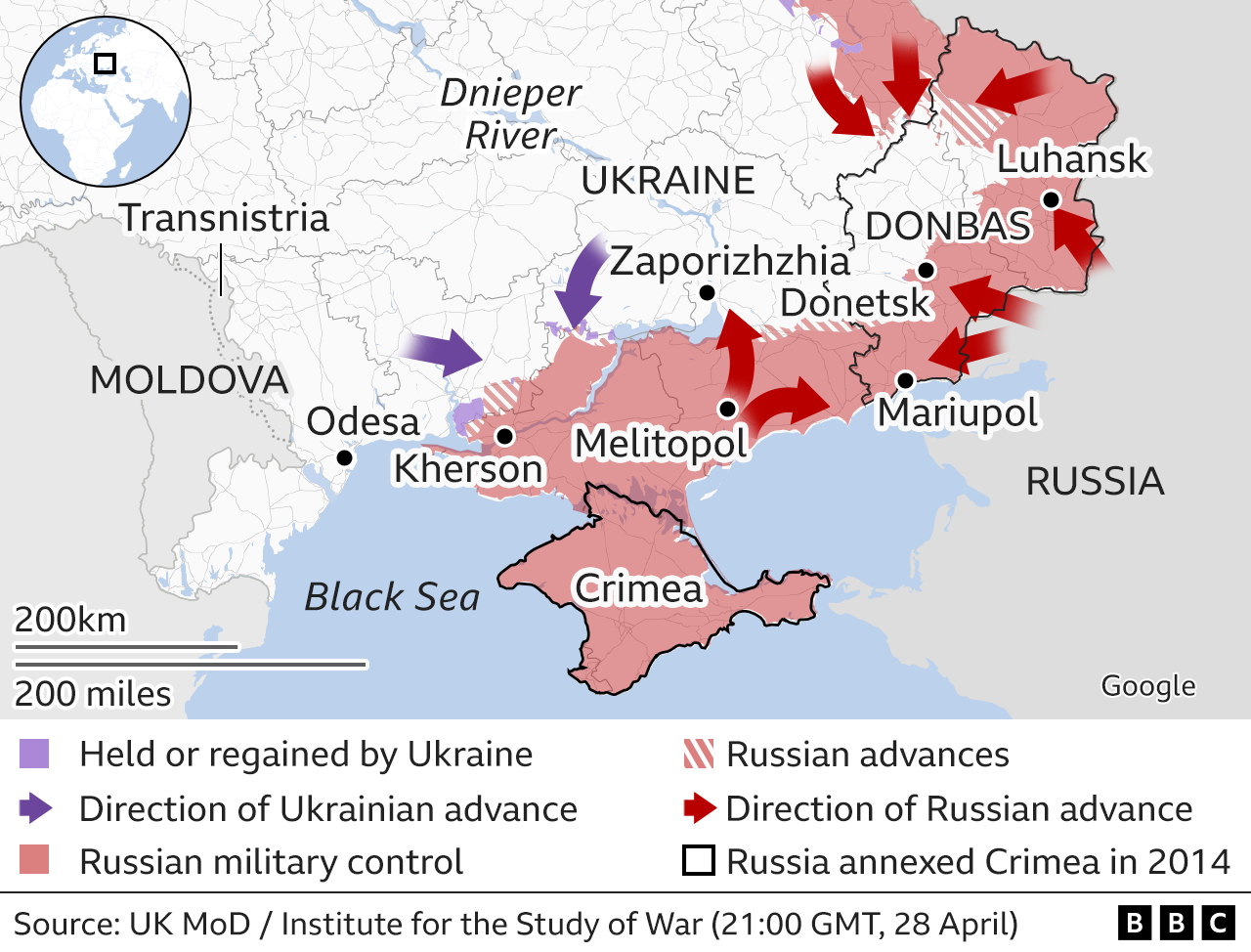A group of about 20 civilians has left the Azovstal steelworks in Mariupol, the final part of the southern city still in the hands of Ukrainian troops.
They are the first group to leave since Russian President Vladimir Putin ordered the vast industrial area sealed off last week.
Talks are ongoing about freeing the reported 1,000 civilians still trapped inside.
Russia is meanwhile said to be stepping up its offensive in the east.
More than a week ago, after saying Mariupol had been captured, President Putin told his troops: “Block off this industrial area so that a fly cannot not pass through.”
But Russian media have reported that 25 civilians managed to leave the Azovstal plant on Saturday, including six children under the age of 14 – but did not say where the group had been taken.
That was confirmed by soldiers inside the steelworks, who put the number at 20 women and children.
The deputy commander of the Azov regiment, Sviatoslav Palamar, said they were “transferred to a suitable place and we hope that they will be evacuated to Zaporizhzhia, on territory controlled by Ukraine.”
Mariupol’s mayor, Vadym Boychenko, told the BBC that people there were “on the borderline between life and death”.
“[People] are waiting, they are praying for a rescue… It’s difficult to say how many days or hours we have to save their lives.”
Taking Mariupol would aid Moscow’s plans to seize the entire south coast of Ukraine, which would unite pro-Russia separatist regions such as Donetsk and Luhansk in eastern Ukraine with Crimea, which Russia annexed in 2014. It would also increase access to the pro-Russia Transnistria area across Ukraine’s western border in Moldova.
On Saturday, three loud explosions were heard in the south-west port city Odesa, which officials said destroyed the runway of the airport rendering it unusable.


A Ukrainian Defence Ministry spokesperson, Oleksandr Motuzyanyk, said Russian troops “are gradually increasing the intensity of their offensive in eastern Ukraine simultaneously along all directions”.
Moscow withdrew its troops from regions around the capital, Kyiv, weeks ago to redeploy them to the east of Ukraine.
“There are signs that the aggressor is preparing for an even bigger activation of military actions,” Col Motuzyanyk said.
Western officials have said Moscow is facing significant challenges in the east.
The UK Ministry of Defence said Russia has been “forced to merge and redeploy depleted and disparate units from the failed advances” and “many of these units are likely suffering from weakened morale”. That echoed statements by US officials overnight that Russia was “at least several days behind where they wanted to be”.
In other developments Saturday:
- A prisoner exchange saw the return of 14 Ukrainians – including one soldier who is five months pregnant – for an unknown number of Russian captives
- Ukraine’s deputy agriculture minister accused Russia of stealing several hundred thousand tonnes of grain from occupied territory, labelling it “outright robbery” – something Moscow denies
- In Bucha, where Ukraine accuses Russia of war crimes, police said they found three bodies of men who had been tied up, blindfolded and apparently tortured
- A Russian diplomat in charge of nuclear non-proliferation, Vladimir Yermakov, said Moscow is sticking to its ideal that nuclear conflict is unacceptable – but accused the West of escalating tensions
- A Ukrainian military official said two out of three buses sent to rescue civilians from Popasna, a town under attack in the Donbas region, had gone missing
The Russian defence ministry said it had hit 17 military targets in Ukraine on Saturday with missiles and air strikes, killing more than 200 Ukrainians along with 23 armoured vehicles and other military equipment.
Each side in the conflict makes regular claims – which cannot be verified by the BBC – about the losses inflicted on the other.









































